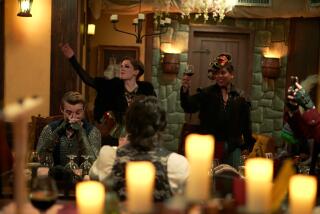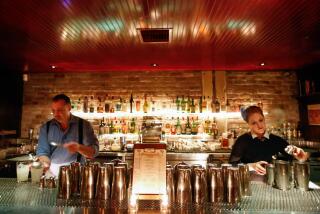English villagers try to save struggling pubs
- Share via
KENTISBEARE, ENGLAND — Last summer, the tranquil English village of Kentisbeare woke up to find a dagger piercing its heart.
The man who ran the neighborhood pub, the Wyndham Arms, had decided to call it quits. Hit by hard times, he locked up one evening and never came back, leaving the village bereft of its “local,” the watering hole down the road where, for more than 200 years, the good folk here could always drop in for a pint, a pie or a piece of gossip.
The tavern seemed destined to become yet another lost marker of traditional village life, bound for the same remorseless oblivion that had already swallowed the baker’s, the butcher’s and the petrol station in this lazy green countryside where bluebells nod in the breeze, medieval church towers loom like giant chess pieces and thatched roofs peek coyly through the leaves.
This time, though, residents drew a line. They retrieved the keys to the pub, renovated the whitewashed 16th century building themselves and reopened it less than two months later.
“People couldn’t bear the thought of it being boarded up,” said Mavis Durrant, 67, a lifelong resident of the village in southwestern England. “There’s something very appealing about a country pub, isn’t there?”
Indeed. For centuries, virtually nothing has been more central to the good cheer and cozy charm of English village life than the local pub, whose name alone -- the Bishop’s Finger, the Drunken Duck, the Quiet Woman, the Moorend Spout -- could summon a smile.
But feel-good stories like the rescue of the Wyndham Arms are rare these days, because pubs are closing down across Britain faster than a thirsty man can down a pint. Colorful and often iconic establishments that managed to survive civil wars, frowning Victorian teetotalism and tales of being haunted are increasingly buckling under to modern market forces, higher taxes and lifestyle changes.
Every week, 39 alehouses call for “last orders” one final time, according to the British Beer and Pub Assn. All told, more than 2,000 taverns have shut down since March of last year, at a cost of 20,000 jobs.
It’s an especially distressing turn of events for those in the countryside, who warn that villages may eventually be reduced to little more than rural dormitories, stripped of the shops, services and gathering places that gave them a sense of identity and cohesion.
“We risk undoing centuries of tradition. An English pub is absolutely part and parcel of English society and community,” said Nick Harvey, a member of Parliament for North Devon, a district in western England where 70 to 80 taverns remain, down from more than 100 just a few years ago.
In many neighborhoods, Harvey said, “the shops have gone, the garage has gone, everything has gone. The pub is the only thing left.”
Britain remains home to 57,000 pubs, including some alehouses that can trace their history to Saxon times. Many still sport the dimly lit interiors, snug alcoves, crackling fireplaces and agreeably low ceilings made of old wooden beams (with signs warning taller customers, “Duck or grouse”) that give old public houses their unique flavor.
Between pulls at the tap and backhanded wipes of the mouth, proprietors and regulars sketch various reasons for the pub’s rapid decline.
Government rules that have allowed big chains to buy up or control thousands of alehouses can make life tough for the tenants who lease the pubs and try to turn a profit. High alcohol duties have steadily pushed up prices at the bar stool, even as supermarkets sell beer at cut-rate prices to draw in customers content to drink at home.
Modern times have also brought new habits and ideas. Because of safety regulations, construction workers and tradesmen no longer have a quick pint during their lunch hour. Britons are now more mobile, meaning they don’t have to stick to their hometown bar. And rising prosperity, before the current recession struck, spurred demands for better food, flashier decoration and more options for families with young children.
Pub managers and traditionalists grumble loudest over the smoking ban instituted in 2007. Business has gone down as a result, publicans say, though the move also brought in some new customers.
But in spite of all the changes, the neighborhood pub remains at the heart of community life in countless towns and villages.
Words written 70 years ago to describe the pub’s preeminent position in British society still resonate today in those places.
“Of the social institutions that mold men’s lives between home and work . . . the pub has more buildings, holds more people, takes more of their time and money, than church, cinema, dance hall and political organizations put together,” the pop-sociological movement Mass-Observation reported in the 1930s.
At the pub, the report said, your hard-earned shilling bought not just a beer but an experience.
You could drink, talk, think, smoke, play cards, throw darts, spit, bet and sing. Equally enjoyable side activities included weddings and funerals, “quarrels and fights,” sex, secret-society meetings, religious processions, crime, prostitution and, rather mystifyingly for the contemporary pubgoer, “pigeon flying.”
The loss of such an important social nerve center can be devastating for a small community -- akin to the death of an old friend, as the quiet village of Bickington learned.
Like Kentisbeare, Bickington sits primly in Devon, in a rustic landscape of sun-dappled fields sliced into puzzle pieces by high hedgerows. The “green and pleasant land” hymned by the English poet William Blake doesn’t get any greener or pleasanter than this.
Villagers watched in dismay as their police station, post office and mechanic’s shop gradually went out of business. When the firm that owned the local pub, the Toby Jug, decided to cut costs and close down the tavern several years ago, it was “the final blow” to communal life, said Caroline Meek, whose family has lived in Bickington since 1809.
“At the moment, if we see each other, it just happens to be out and about . . . catching five minutes here or there,” Meek said of the village’s residents. “Before, that would’ve happened in the pub over a nice drink.”
Villagers have lobbied the Toby Jug’s owner to reopen it, to no avail. They hold a candlelight vigil for their dearly departed tavern every Christmas Eve, out of both a sense of mourning and hope, but the building remains shuttered and forlorn, its white walls dingy from neglect, its quaint old sign missing.
“When you used to walk down there when the lights were on, on a cold winter’s night, and there was a roaring fire on, that was a lovely feeling,” said Meek, 34. “When you see it now, it just looks like a gray shell, and it’s quite sad.”
With the nearest pub at least three miles in either direction, “we’re kind of marooned. We have to get in a car or catch a taxi,” Meek said. “My husband is quite a traditional chap really, and going to the pub is something he’d like to do with his friends once a week, twice a week. It takes a tremendous effort to try to do that.”
Bickington’s fate is precisely what Mike Scales sought to avert in Kentisbeare when he rallied his neighbors to help save the Wyndham Arms last summer.
By then, the tavern was ailing, no longer as well frequented as it once was, which residents attribute to poor management by the man who ran it until he gave up last July.
The threat of losing the place altogether galvanized 80 volunteers from the village who spent eight weeks scrubbing, stripping, painting, hammering, wiring and redecorating the former farmhouse, whose wooden rafters were erected when their grandfathers’ grandfathers hadn’t been born.
“We had people in here seven days a week, on different shifts, from 8 o’clock in the morning till sunset,” said Scales, a genial 61-year-old who has been involved in the pub industry, mostly as an auditor, since leaving the navy 35 years ago.
“I was probably one of the few that kept coming, and that’s why I didn’t want to see it go,” he said of the Wyndham Arms, which is named after the family that at one time virtually owned Kentisbeare. “It’s the center of the village.”
Enterprise Inns, the company that owns the tavern, was so impressed by the community’s efforts that it agreed to throw in $150,000 to overhaul the roof and the heating system. Scales is now busy putting in a new kitchen.
He knows the battle for survival isn’t over. To remain a viable concern, the alehouse has to keep customers coming back, which is why it serves better food, welcomes children and dogs, and, as its latest innovation, offers Wi-Fi.
But for now the inhabitants of Kentisbeare once more have somewhere to go for a pint and a chat, especially the elderly regulars -- “the gargoyles,” Scales calls them -- who like to come in the early evening.
“People need to talk to each other. They need to communicate. They need to feel as though they belong to a community,” Scales said. “If I’ve done nothing in my miserable life, this is perhaps one good thing.”
Then he got up to make a round of the tables, among laughing and chatting customers who greeted him by name.
Cheers!
--
More to Read
Sign up for Essential California
The most important California stories and recommendations in your inbox every morning.
You may occasionally receive promotional content from the Los Angeles Times.











